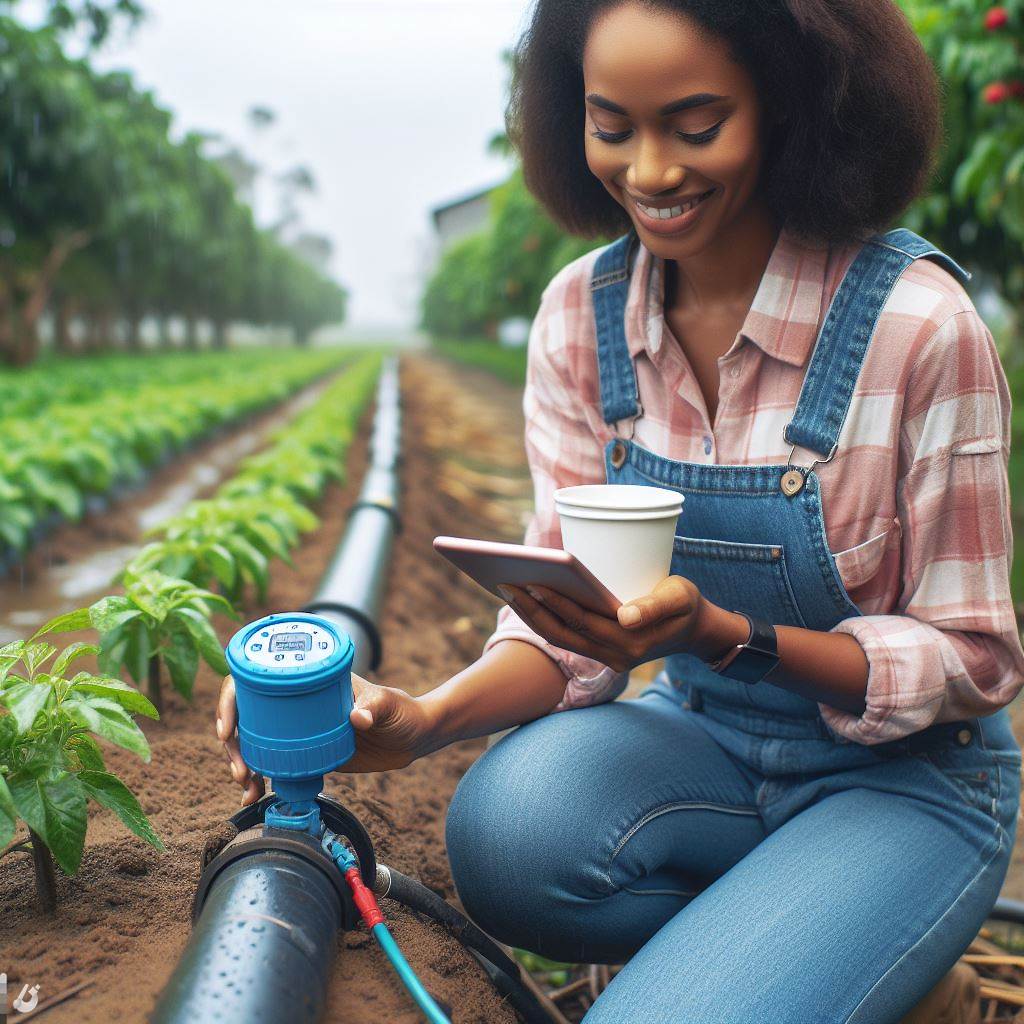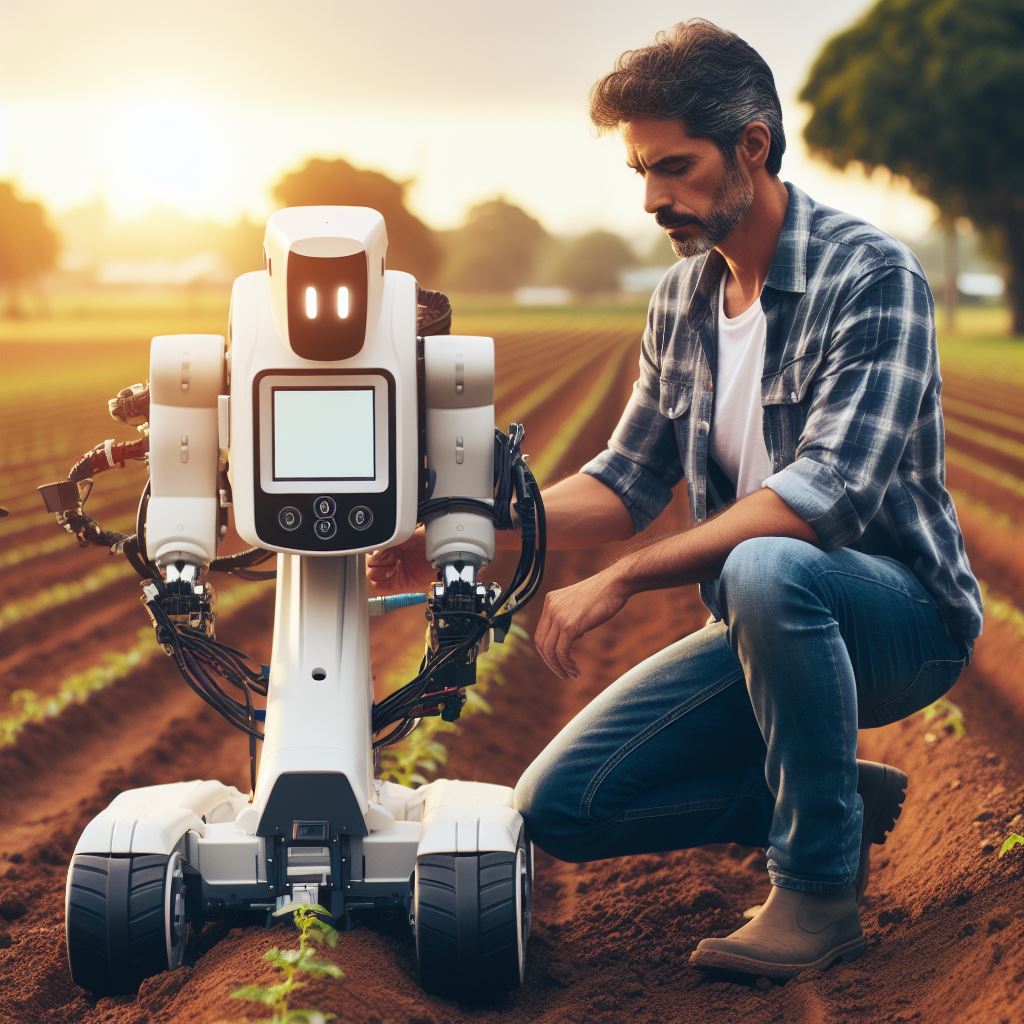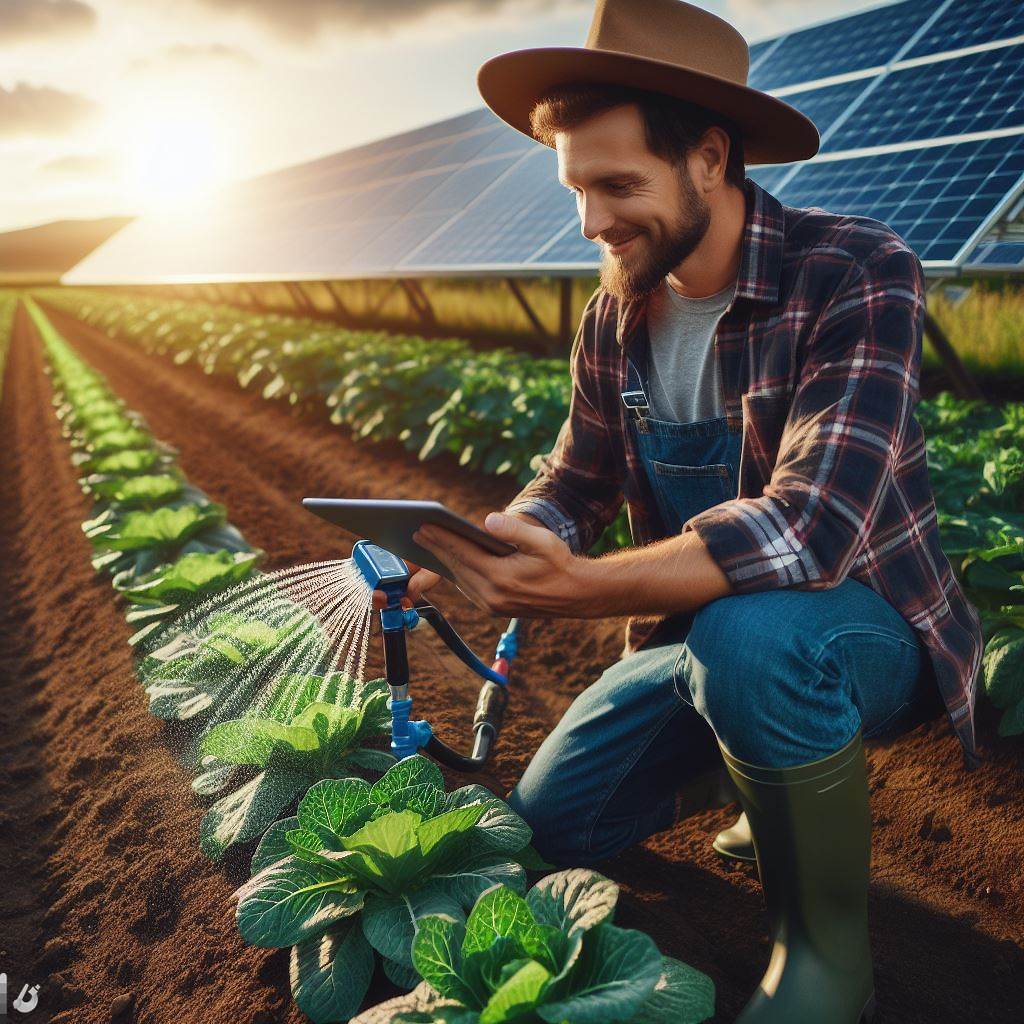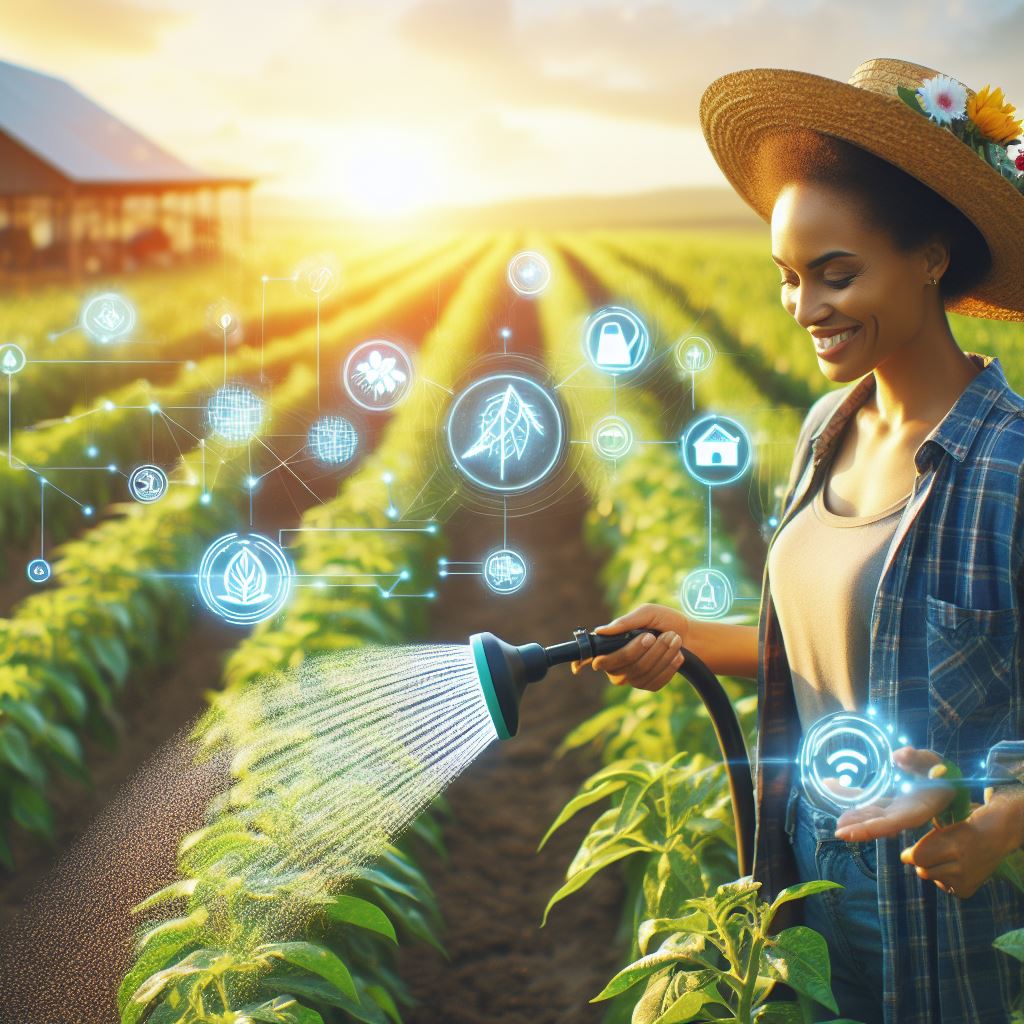Introduction
Brief overview of the importance of water in agriculture
Water is a vital resource in agriculture, playing a crucial role in crop growth, yield, and overall farm productivity.
As farmers face the constant challenge of balancing water availability and demand, smart sensors emerge as a game-changer in transforming water use on farms.
Introduction to smart sensors and their role in changing farm water use
Smart sensors are innovative devices that utilize advanced technologies to monitor and manage various aspects of farming operations.
These sensors can measure soil moisture levels, weather conditions, and plant health, providing farmers with real-time data and insights.
By collecting and analyzing this data, farmers can make informed decisions about when and how much water to use, optimizing irrigation practices and minimizing waste.
The role of smart sensors in changing farm water use cannot be overstated.
These sensors enable farmers to precisely determine the water needs of specific crops and adjust irrigation accordingly.
By avoiding overwatering and providing water only when necessary, farmers can conserve water resources and reduce their environmental impact.
Furthermore, smart sensors also help farmers detect leaks or malfunctions in irrigation systems promptly.
This early detection allows for timely repairs, preventing water loss and potential crop damage.
By optimizing water use through the integration of smart sensors, farmers can not only increase their water efficiency but also enhance their overall profitability and sustainability.
Basically, smart sensors are revolutionizing the agricultural sector by changing farm water use.
By providing real-time data and insights, these devices empower farmers to make informed decisions, optimize irrigation practices, conserve water, and reduce environmental impact.
As the world faces increasing water scarcity and climate change challenges, smart sensors have become a crucial tool in ensuring efficient and sustainable water management in agriculture.
The Need for Efficient Water Management in Agriculture
Importance of water scarcity in the agricultural sector
Water scarcity is a pressing issue in agriculture, as it has a direct impact on food production.
Transform Your Agribusiness
Unlock your farm's potential with expert advice tailored to your needs. Get actionable steps that drive real results.
Get StartedWithout efficient water management, farmers face challenges in meeting the growing demand for food.
Insufficient water supply can lead to crop failure, reduced yield, and even loss of livelihood for farmers.
Challenges faced by farmers in managing water effectively
Limited water availability poses a major obstacle for farmers, especially in regions prone to drought.
Water wastage is a significant concern, as outdated irrigation methods often lead to inefficiencies in water use.
Lack of awareness about water-saving practices and technologies further complicates the situation for farmers.
Need for advanced technology solutions to optimize water use
Smart sensors have emerged as a game-changer, enabling farmers to accurately monitor and control water usage.
These sensors collect real-time data on soil moisture, temperature, and other factors to optimize irrigation.
By utilizing smart sensors, farmers can adjust irrigation schedules and volumes based on actual water needs.
Additionally, advanced technology allows for precise water distribution, reducing wastage and maximizing efficiency.
Smart irrigation systems, equipped with sensors, can save up to 50% of water compared to traditional methods.
Innovative solutions like automated drip irrigation and precision spraying further contribute to water conservation.
Adopting these technologies not only benefits farmers but also helps protect the environment by reducing water pollution.
The need for efficient water management in agriculture cannot be underestimated.
Water scarcity and its impact on food production highlight the urgency of finding sustainable solutions.
By addressing the challenges faced by farmers and embracing advanced technology, we can optimize water use.
Smart sensors and innovative irrigation methods provide a pathway towards more sustainable farming practices.
It is crucial for governments, agricultural organizations, and farmers to collaborate and invest in these solutions.
Through efficient water management, we can ensure food security, preserve ecosystems, and mitigate the effects of climate change.
Read: Drone Tech in Agriculture: A Sky-High View
Understanding Smart Sensors in Farming
What smart sensors are
- Smart sensors are innovative devices that can gather and analyze data in real-time.
- They are used to monitor and measure various environmental parameters in farming.
- These sensors are equipped with wireless capabilities to transmit data to a centralized system.
Different types of smart sensors used in agriculture
Soil moisture sensors
- These sensors measure the amount of moisture content in the soil.
- They provide crucial information about when and how much water should be applied.
- Farmers can adjust irrigation schedules based on the data received from these sensors.
Weather sensors
- Weather sensors monitor key meteorological factors such as temperature, humidity, and rainfall.
- This data helps farmers in understanding weather patterns and forecasting water requirements.
- With accurate weather information, farmers can optimize water usage and irrigation schedules.
Crop health sensors
- These sensors assess crop health by measuring parameters such as chlorophyll content and leaf temperature.
- Early detection of crop stress or disease allows farmers to take timely action, reducing water wastage.
- By monitoring crop health, smart sensors help farmers optimize water usage and improve crop yield.
Benefits of using smart sensors for water management in farming
Efficient water usage
- Smart sensors enable precise and targeted irrigation, minimizing water runoff and evaporation.
- By providing real-time data, these sensors optimize water distribution based on crop needs and weather conditions.
- This results in reduced water wastage and improved water use efficiency in farming.
Cost savings
- Smart sensors provide data-driven insights for farmers to make informed decisions regarding water management.
- By optimizing water usage, farmers can reduce their water bills significantly.
- Proper water management with smart sensors leads to cost savings and increased profitability for farmers.
Environmental sustainability
- Using smart sensors for water management helps conserve water resources.
- By minimizing water usage, farmers contribute to the preservation of ecosystems and natural habitats.
- Smart sensor technology promotes sustainable farming practices, reducing the environmental impact of agriculture.
Increased productivity
- By monitoring crop health and providing timely information, smart sensors help farmers prevent crop loss.
- Optimized water management ensures that crops receive the right amount of water for optimal growth.
- Increased productivity leads to higher crop yields, enhancing food production and food security.
Generally, smart sensors are revolutionizing water management in farming.
These innovative devices offer real-time data on soil moisture, weather conditions, and crop health.
With their ability to optimize water usage, farmers can conserve water, reduce costs, and improve productivity.
Embracing smart sensor technology in agriculture brings us closer to sustainable and efficient farming practices.
Read: AI in Farming: Revolutionizing Crop Management
Showcase Your Farming Business
Publish your professional farming services profile on our blog for a one-time fee of $200 and reach a dedicated audience of farmers and agribusiness owners.
Publish Your ProfileApplications of Smart Sensors in Farm Water Use
Monitoring soil moisture levels
Maintaining optimal soil moisture is crucial for crop growth.
Smart sensors provide real-time data on soil moisture.
Smart sensors play a vital role in providing accurate information about soil moisture levels.
Farmers can receive real-time data, allowing them to make informed decisions about watering their crops.
By monitoring soil moisture levels, farmers can ensure that their fields are neither too dry nor oversaturated, leading to more efficient water use.
Tracking irrigation needs
Determining the correct amount of water required for irrigation can be a challenging task for farmers.
Smart sensors offer a solution to this problem by providing accurate measurements of soil moisture.
With the help of smart sensors, farmers can accurately measure soil moisture levels to determine the irrigation needs of their crops.
By receiving real-time data, farmers can adjust their irrigation schedules accordingly, ensuring that their crops receive the optimal amount of water.
This not only saves water but also improves crop yield and reduces the risk of overwatering or underwatering.
Detecting leaks and water losses
Detecting and addressing water leaks on farms is significant in minimizing water waste.
Smart sensors can aid in identifying leaks promptly.
Water leaks can lead to substantial water losses on farms, resulting in increased costs and environmental impact.
Smart sensors can detect leaks in irrigation systems, allowing farmers to identify and address them promptly.
By minimizing water waste, farmers can make their water use more sustainable and reduce the negative impacts on the environment.
In short, smart sensors have various applications in farm water use.
They help farmers monitor soil moisture levels, track irrigation needs accurately, and detect leaks and water losses.
By utilizing these technologies, farmers can optimize their water usage, improve crop yield, reduce costs, and contribute to sustainable agriculture practices.
Read: Precision Agri: GPS Guided Farming Explained
Benefits and Impacts of Smart Sensors on Farm Water Use
In today’s world, where water scarcity is a growing concern, the use of smart sensors in agriculture has emerged as a game-changer.
These innovative devices offer numerous benefits and have a significant impact on farm water use.
Let’s explore some of the key advantages:
Increased water efficiency and conservation
- Smart sensors enable precise monitoring of soil moisture levels, ensuring water is used only when necessary.
- Real-time data from these sensors allows farmers to adjust irrigation schedules, minimizing water waste.
- By optimizing water use, smart sensors contribute to the conservation of this valuable resource.
Improved crop yield and quality
- Accurate information from smart sensors helps farmers make informed decisions regarding irrigation.
- By supplying crops with the right amount of water at the right time, yield and quality can be significantly enhanced.
- Smart sensors also detect crop stress levels, ensuring timely interventions for better plant health.
Reduction in costs associated with water usage
- Effective water management through smart sensors leads to cost savings by eliminating unnecessary water expenditure.
- By avoiding overwatering or underwatering, farmers can reduce the expenses associated with irrigation.
- Smart sensors also minimize energy consumption related to water pumping and distribution systems.
Environmental benefits and sustainability
- By conserving water, smart sensors contribute to the overall sustainability of agricultural practices.
- Reduced water usage helps preserve natural water sources, such as rivers and groundwater reservoirs.
- Smart sensors also minimize the risk of fertilizer and pesticide runoff, protecting water quality.
Long-term impact on the agricultural industry
- The adoption of smart sensors revolutionizes farming practices, making them more efficient and sustainable.
- As more farmers embrace this technology, a collective impact is achieved, addressing water scarcity challenges.
- The agricultural industry becomes resilient against water-related uncertainties and adapts to changing climate conditions.
Essentially, smart sensors bring about transformative changes in farm water use.
The benefits include increased water efficiency, improved crop yield, cost reduction, environmental benefits, and long-term sustainability.
By harnessing the power of technology, farmers can become more resilient while contributing to the preservation of our most valuable resource – water.
Read: Robotic Hands in Fields: Future of Harvesting

Case Studies and Success Stories
These case studies and success stories highlight the effectiveness of smart sensor technology in transforming farm water management practices.
By providing concrete examples, they demonstrate the potential benefits and positive experiences that can be achieved through the adoption of smart sensors.
Examples of farms implementing smart sensor technology for water management
Meadows Farm serves as an example of how implementing smart sensors can enhance irrigation scheduling.
By continuously monitoring soil moisture levels, the farm was able to apply water only when necessary, resulting in efficient water usage and healthier crops.
Similarly, White Diamond Farm showcases the use of smart sensors in detecting leaks in irrigation systems.
This proactive approach enabled the farmer to address issues promptly, preventing water waste and potential damage to the crops.
Positive outcomes and experiences shared by farmers using smart sensors
The positive outcomes shared by farmers using smart sensors further emphasize the advantages of this technology.
Daniel Craig, for instance, reported a significant reduction in water usage after implementing smart sensors, which not only saved them resources but also had a positive environmental impact.
Moreover, Peter Jim highlighted the time and resource-saving benefits of using smart sensors.
With automation, farmers can eliminate manual monitoring and control of irrigation processes, allowing them to focus on other essential tasks while still ensuring optimal water usage.
Real-life examples of water savings achieved through smart sensor adoption
Real-life examples of water savings achieved through smart sensor adoption add credibility to the effectiveness of this technology.
Jim Pride Microfarm, for example, managed to reduce water consumption by 40% by integrating smart sensors into their irrigation system.
By closely monitoring soil moisture and weather conditions, they were able to adjust their irrigation practices accordingly.
Janny Agro Farm’s success story further solidifies the impact of smart sensors on water savings.
Showcase Your Farming Business
Publish your professional farming services profile on our blog for a one-time fee of $200 and reach a dedicated audience of farmers and agribusiness owners.
Publish Your ProfileImplementing these sensors throughout their irrigation system resulted in a remarkable 50% reduction in water usage, emphasizing the significant potential for cutting costs and promoting sustainable water management practices.
In general, these case studies and success stories demonstrate the tangible benefits of implementing smart sensor technology in farm water management.
The examples highlight improved irrigation scheduling, leak detection, reduced water usage, and resource savings.
This evidence-based approach inspires other farmers to consider adopting smart sensors and contribute to more sustainable agriculture.
Gain More Insights: LED Tech in Greenhouse Cultivation
Challenges and Limitations of Smart Sensor Technology
Initial investment and implementation costs
- Farmers may face high initial investment costs when installing smart sensor technology.
- The cost of purchasing and setting up the required sensors and equipment can be significant.
- Additionally, the need for professional installation and expertise adds to the overall costs.
- Smaller farms or those with limited resources may find it challenging to afford the implementation.
- However, the long-term benefits and savings associated with smart sensors can outweigh the initial costs.
Technical challenges and maintenance requirements
- Ensuring proper calibration and maintenance of smart sensors is crucial for accurate data collection.
- Technical challenges may arise, such as connectivity issues or data transfer problems.
- Regular monitoring and maintenance of sensors and associated systems are necessary to avoid malfunctions.
- Specialized knowledge or professional assistance might be required to address technical issues effectively.
- Investing time and resources into maintaining the technology is essential for its optimal performance.
Limitations in certain farming environments or situations
- Smart sensor technology may not be suitable for all types of farming environments.
- In areas with extreme weather conditions or harsh climates, sensors may face durability challenges.
- Some sensor models may not be compatible with specific soil types or water sources.
- Interference from other equipment or materials in the farming environment can affect sensor accuracy.
- Farmers need to carefully assess their specific circumstances and choose sensors that meet their requirements.
In essence, while smart sensor technology offers numerous benefits for improving farm water use, it also comes with challenges and limitations.
Farmers must consider the initial investment costs and ensure they have the financial resources to implement the technology.
Technical challenges and maintenance requirements, including calibration and regular monitoring, should not be overlooked.
Furthermore, certain farming environments or situations may not be suitable for smart sensors, requiring farmers to assess their specific circumstances before adoption.
By understanding and addressing these challenges and limitations, farmers can maximize the potential of smart sensor technology and optimize their water usage.
Future Trends and Potential Advancements in Smart Sensors for Farm Water Use
Potential for integration with other farming technologies
- Smart sensors have the potential for seamless integration with other farming technologies.
- This integration can lead to greater efficiency and optimized water use in agricultural practices.
- By combining data from smart sensors with technologies like precision irrigation, farmers can achieve optimal water utilization.
- Integration with automation systems can enable real-time adjustments to water application based on sensor readings.
Advances in data analysis and predictive modeling
- Advancements in data analysis will allow for more accurate interpretation of sensor data.
- These techniques can identify patterns, trends, and anomalies in water use, enabling proactive decision-making.
- Predictive modeling can help farmers anticipate water needs and optimize irrigation schedules, reducing water wastage.
- Machine learning algorithms can be trained to predict crop water requirements based on historical data and environmental factors.
Enhanced connectivity and remote monitoring capabilities
- Smart sensors are becoming more connected, allowing remote monitoring and control of water usage.
- Wireless communication technologies enable real-time data transmission from sensors to a central monitoring system.
- Farmers can remotely access sensor data through mobile applications or web interfaces, enhancing convenience and accessibility.
- Alerts and notifications can be sent to farmers in case of abnormal water usage, facilitating quick response and preventive actions.
Future of farm water use management
With these advancements in smart sensors, the future of farm water use management looks promising.
By integrating smart sensors with other farming technologies, farmers can achieve higher levels of efficiency and productivity in their water use.
Real-time monitoring and analysis of sensor data, coupled with predictive modeling, can enable proactive water management strategies.
This can result in significant water savings, reduced costs, and environmental sustainability.
Furthermore, with enhanced connectivity, farmers can have greater control over irrigation systems and respond promptly to any deviations in water usage.
The potential benefits of smart sensors in farm water use extend beyond individual farms.
Collective data from a network of smart sensors can provide valuable insights at a regional or even national level.
Policy-makers and water resource managers can leverage this data to make informed decisions regarding water allocation and conservation.
In a nutshell, the future trends in smart sensors for farm water use are focused on integration, data analysis, and connectivity.
Growers can expect increased efficiency, improved decision-making, and reduced environmental impact through the adoption of these advancements.
With the potential to revolutionize water management in agriculture, smart sensors are a key technology in ensuring sustainable farming practices.
Conclusion
Smart sensors have revolutionized water management in agriculture.
They have enabled farmers to optimize water usage, reduce costs, and improve crop yields.
The benefits of smart sensors in smart farming are undeniable, from improved water efficiency and increased crop yields to reduced costs and minimized environmental impact.
The future of sensor-based irrigation systems is filled with immense possibilities.
In this blog post, we have explored the importance of smart sensors in changing farm water use.
We have discussed the benefits and impacts of smart sensor adoption, including improved water efficiency, enhanced crop yield and quality, reduced water and energy costs, and minimized environmental impact.
We have also encouraged farmers to consider implementing smart sensor technology for efficient water management.
By adopting smart sensors, farmers can optimize their water usage, reduce costs, and improve crop yields.
Smart sensors are a game-changer in the agricultural industry, and their adoption is essential for sustainable agriculture.
We hope that this blog post has provided you with valuable insights into the world of smart sensors and their role in changing farm water use.
We encourage you to explore the possibilities of smart sensor technology and take advantage of its benefits for efficient water management in agriculture.




